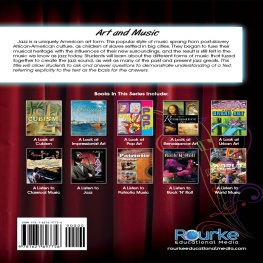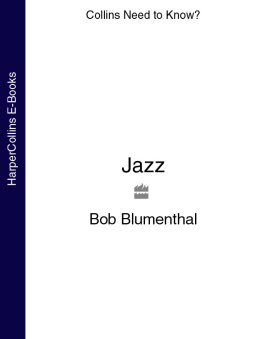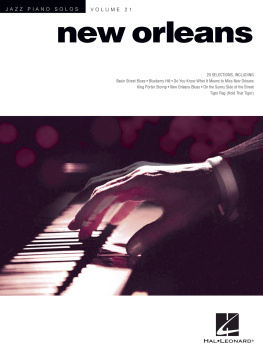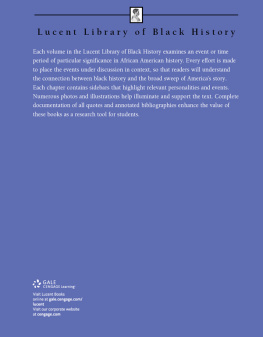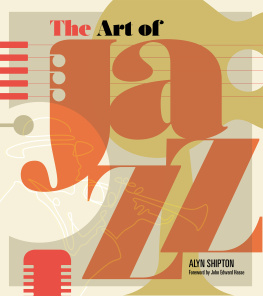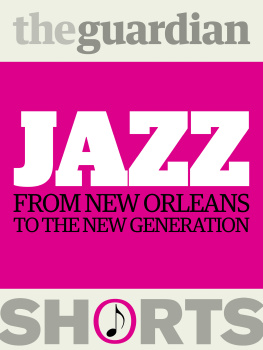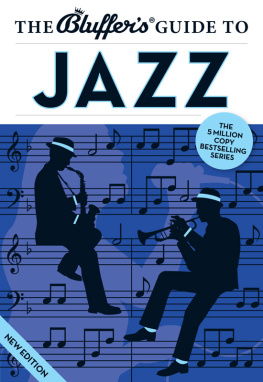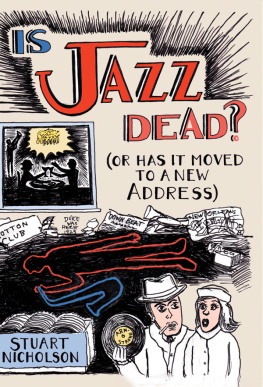MORE PRAISE FOR

TRADITIONAL
NEW ORLEANS JAZZ

In an era when critics are pondering the denouement of jazz, there is a tendency to relegate New Orleanss role to first act status and to leave it at that. Thomas Jacobsens book contradicts that assumption in exploring how New Orleans jazz has thrived in the last half century, continuing to attract and produce exceptional jazz talent. In this compilation of interviews, each with a distinct character, new generation stars such as Irvin Mayfield, Evan Christopher, and Tim Laughlin, British expatriates Trevor Richards, Clive Wilson, and Brian Ogilvie, and such major unsung heroes as Lionel Ferbos, Eddie Bayard, and Jack Maheu talk about their lives in New Orleans music. Any jazz lover who picks up this book will not be able to put it down.
BRUCE BOYD RAEBURN
curator of the Hogan Jazz Archives
Jacobsens knowledge of New Orleans jazz is deep and wide ranging. Traditional New Orleans Jazz is skillfully written, researched with a scholarly thoroughness, and is clear, readable, and useful. I am confident this significant book will be welcomed by musicians worldwide.
JAMES GILLESPIE
editor of The Clarinet
Thomas Jacobsen is not only incredibly knowledgeable about jazz, he is clearly at ease with the community of artists he writes aboutauthentic to the core. Much has been written about the originators of jazz in New Orleans. Jacobsens contribution is to show the vitality of many of todays key traditional jazz artists. He has given us an accurate, heartfelt, and downright entertaining picture of many of todays leading traditional jazz artists in New Orleans. Jacobsen, a fine jazz scholar, could have given us yet another book on early New Orleans pioneers. Happily, he chose to profile working artists, each with their own links to the citys rich jazz past.
CHARLES SUHOR
author of Jazz in New Orleans: The Postwar Years through 1970
TRADITIONAL
NEW ORLEANS JAZZ

Guitarist Danny Barker in a jam session on a cruise boat on the Hudson River as part of the Jazz on the River series, New York City, 1946. The bassist is New Orleans native George Pops Foster. Photograph from the estate of the late Charles Peterson, courtesy of Don Peterson.
TRADITIONAL
NEW ORLEANS
JAZZ
CONVERSATIONS WITH THE MEN WHO
MAKE THE MUSIC
THOMAS W. JACOBSEN

Published by Louisiana State University Press
Copyright 2011 by Thomas W. Jacobsen
All rights reserved
Manufactured in the United States of America
LSU Press Paperback Original
First printing
DESIGNER: Michelle A. Neustrom
TYPEFACE: Whitman
PRINTER: McNaughton & Gunn, Inc.
BINDER: Dekker Bookbinding
Except where otherwise noted, all photographs were taken by Thomas W. Jacobsen.
Grateful acknowledgment is made to the owners of The Mississippi Rag, in which most of these interviews first appeared, albeit in somewhat different form.
LIBRARY OF CONGRESS CATALOGING-IN-PUBLICATION DATA
Jacobsen, Thomas W., 1935
Traditional New Orleans jazz : conversations with the men who make the music / Thomas W. Jacobsen.
p. cm.
Includes index.
ISBN 978-0-8071-3779-6 (pbk. : alk. paper) 1. Jazz musiciansLouisianaNew OrleansInterviews. 2. JazzLouisianaNew OrleansHistory and criticism. I. Title.
ML395.J33 2011
781.653dc22
2010029105
The paper in this book meets the guidelines for permanence and durability of the Committee on Production Guidelines for Book Longevity of the Council on Library Resources. 

To Mr. Lionel Ferbos, the oldest active jazz musician in New Orleans and a truly class act, as he approaches his personal centennial
CONTENTS
LIONEL FERBOS
New Orleans Gentleman of Jazz
EDDIE BAYARD
Crescent City Cornetist
DON VAPPIE
New Orleans Music in His Blood
TIM LAUGHLIN
Second Banana or Heir Apparent?
IRVIN MAYFIELD
Boy Wonder
LUCIEN BARBARIN, LEROY JONES, HERLIN RILEY,
GREGG STAFFORD, JOE TORREGANO, AND DR. MICHAEL WHITE
Dannys Boys Grow Up
JACK MAHEU
The General
JOHN ROYEN
New Orleans Stridemaster
EVAN CHRISTOPHER
Young Man with a Musical Plan
DUKE HEITGER
New Duke in the Jazz Kingdom
TOM FISCHER
Versatile Reedman
CLIVE WILSON
English Accent, New Orleans Soul
BRIAN OGILVIE
New Orleans Pilgrim
TREVOR RICHARDS
Rhythm Is His Business
ILLUSTRATIONS
PREFACE
No matter what you play, if you live in New Orleans, you have to
play some jazz. You have to know some traditional jazz.
DON VAPPIE
I T IS WIDELY ACCEPTED THAT JAZZ MUSIC FIRST APPEARED and took root in New Orleans and its immediate vicinity around the turn of the twentieth century, though its precise form and the exact date remain unsettled. Those issues become somewhat clearer by the end of World War I with the recordings of the Original Dixieland Jass Band from New Orleans. These are generally considered to be the earliest extant jazz records. Thereafter, in the early 1920s, jazz had clearly become established, as is apparent from the recordings of pioneer artists such as King Oliver, Freddie Keppard, Louis Armstrong, and Jelly Roll Morton. That era was dubbed the Jazz Age by contemporary author F. Scott Fitzgerald.
The early forms of this music are now generally referred to as traditional jazz. Classic jazz is another term that normally includes early jazz styles. Dixieland sometimes implies the same general meaning but more often seems to have a slightly different stylistic connotation. In any case, the term traditional jazz (or occasionally the shortened British trad) will be used for the most part in this book. It is the music that has made New Orleans famous and given the city its reputation as the birthplace of jazz.
Traditional jazz is normally performed in small groups, the largest of which are either sextets or septets made up of a standard front line of trumpet/cornet, clarinet, and trombone with a rhythm section composed of piano, bass (brass or string), and drums. Many bands also added a banjo or guitar. Traditional jazz does not include the larger swing bands of the later 1930s and 40s, but we must always be careful not to over-stress the use of labels to describe jazz styles. As one of the great traditionalistsbanjoist, guitarist, and bandleader Eddie Condonsimply put it, We called it music.
The history of traditional New Orleans jazz has been continuous since its origins, but it has had some ups and downs in terms of popularity. The early apex was reached in the 1920s and early 30s, its popularity being eventually superseded by that of the big dance bands of the Swing Era. But there was a resurgence of trad (and Dixieland) in the 1940s and 1950s (sometimes termed the Trad Revival), which seems to have lasted in New Orleans (perhaps more than elsewhere in the States) into the 1960s. Notable forces in this local phenomenon were the formation of the New Orleans Jazz Club in 1948 and the foundation of Preservation Hall in 1961 and its short-lived clone, Dixieland Hall, the following year. Indeed, the NOJC and Preservation Hall have helped to keep traditional jazz alive in the Crescent City to the present day.
Next page

